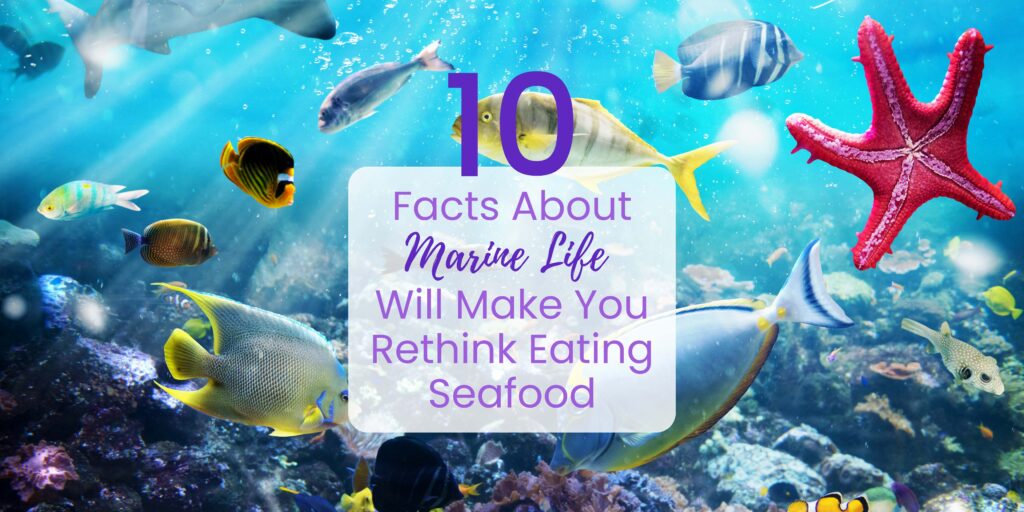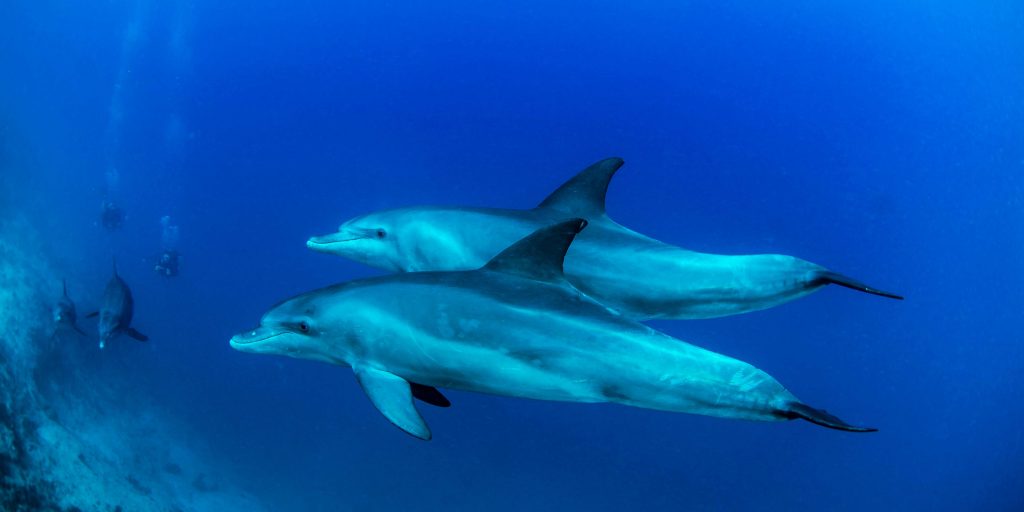
If you still eat seafood or know anyone who does, these facts about marine life might open up a whole new avenue of thought and consideration for species we know so little about.
Did you know? ↓
1. Fish are highly intelligent
Fish are not all that different from us – we avoid situations we know to cause pain and seek out experiences with rewards. Well, so do they! Fish can also develop the ability to use tools. For example, many of them use rocks to crack open and feed on bivalves such as clams, oysters and mussels. Some fish even aim and catch prey from above the water surface by shooting water at them, with just the right volume based on the size of their target.
These facts barely scratch the surface when it comes to fish sentience and intelligence.
2. Killing Pufferfish can kill you back
Fugu, or pufferfish, are “luxury fish” that are eaten all year round in Japan. But bear this in mind: poison lurks in parts of the pufferfish’ bodies that are otherwise edible, and to some, delicious too. If the chef isn’t well-trained, this delicacy can be fatal. Uhh, no thanks!
3. Dolphins enjoy getting high
It seems no one wants to leave the poor puffer fish alone! Eating them might be risky for us humans, but dolphins experience something completely different – they get stoned! You heard that right. Like many animals, dolphins find natural ways to get high, recreationally. They sometimes even do it in groups.
These playful, gentle, and highly intelligent animals are often caught in fishing nets as by-catch. Want dolphins to live their lives in peace? Then you might have to consider leaving fish off your plates, or opting for a plant-based alternative instead!
4. Tuna and Shellfish contain mercury
Like many other large fish in the sea, tuna and other shellfish contain the highly toxic compound mercury. For this reason, the U.S. Food and Drug Administration recommends “limiting the amount you eat, especially if you are a pregnant woman.”
Why not ditch the risk entirely and switch to a mercury-free, plant-based tuna like OmniTuna? The options are plenty – you can even make your own!
5. Crabs, Lobsters, and Crayfish feel pain, anger, fear, and happiness
According to researchers from York University, octopuses, crabs, lobsters, crayfish, and other invertebrates are indeed sentient and can feel pain, anger, fear, and happiness. Sadly, invertebrates are rarely ever recognized as sentient and end up succumbing to the worst treatment, such as being boiled alive for food.
On the bright side, in the UK, “the scope of the Animal Welfare (Sentience) Bill has today been extended to recognise lobsters, octopus and crabs and all other decapod crustaceans and cephalopod molluscs as sentient beings.” Will this influence the food choices of more people? Maybe!
6. Shrimp are smart, responsible little fellows
Shrimp often have symbiotic relationships with fish and corals. They help clean parasites, bacteria and fungi off the fish’s mouth and guard corals in exchange for food. They also happen to be an important source of food for many crabs, sea urchins, whales, dolphins, and seabirds.
At the rate at which people are overfishing and consuming them, the natural food chain in the oceans is getting increasingly disrupted. David Attenborough speaks a lot about this in his documentaries.
7. Fish have numerous nerve endings in their mouths
Imagine being lured with our favorite snacks and then getting hooked on the lips – ouch! This is certainly an equally painful experience for fish. We might struggle to equate the two, but this is likely because fish just look and act so different to humans.
If we consider the sheer scale at which fish are being killed, on top of the cold ways in which they are slaughtered or left to die, the suffering experienced by fish may be greater than that of any other group of sentient beings on the planet.
8. Sharks aren’t as scary as you think
Sharks have a bad reputation because of hyper-dramatised horror movies like Jaws. Though many non-divers imagine that sharks are man-eating monsters that are out to kill, it’s important to know that sharks only kill an average of 10 people per year worldwide. On the other hand, humans kill 11,500 sharks per HOUR! That’s over 70 million a year. Who is the more violent one?
9. Octopuses are some of the most caring mums
Once mum octopus has laid her eggs, she cares for them until they hatch, not once leaving their sight – not even to feed! They basically starve themselves to protect their eggs, and reach their limit and die as soon as their babies are born. This leads us to the next point…
10. Newborn octopuses are tinier than your little finger
And they are fully functional even at that size! Not only are they magnificent, curious, and highly intuitive beings, but they’re also just undeniably cute! Watch this beautiful documentary My Octopus Teacher on Netflix to be even more in awe. You’ll never see octopuses as “food” ever again.

These facts about marine life and all their wonders might make you reconsider ordering seafood the next time you’re dining out! If you’re already veg*n, do consider sharing this article with a pescatarian friend or family member, for what it’s worth. Opening up our minds and being curious to learn about the intelligence and complexities of underwater beings is itself a big step towards change.
If you liked this article and feel inspired to try swapping out seafood, you’ll enjoy these related articles:
– 10 Best Vegan Fish and Chips Restaurants in the World
– 8 Thought-Provoking Documentaries on our Oceans
– 5 Things you can do at Home for the Environment
Go on and explore the rest of the HappyCow blog. To find vegan food near you, at any time and place, get the HappyCow app. Follow us on Instagram, Facebook, Pinterest, and Twitter for vegan tips, stories, guides, recipes, and a lot more.
—
Many of these facts are adapted from The Smiling Seahorse.





